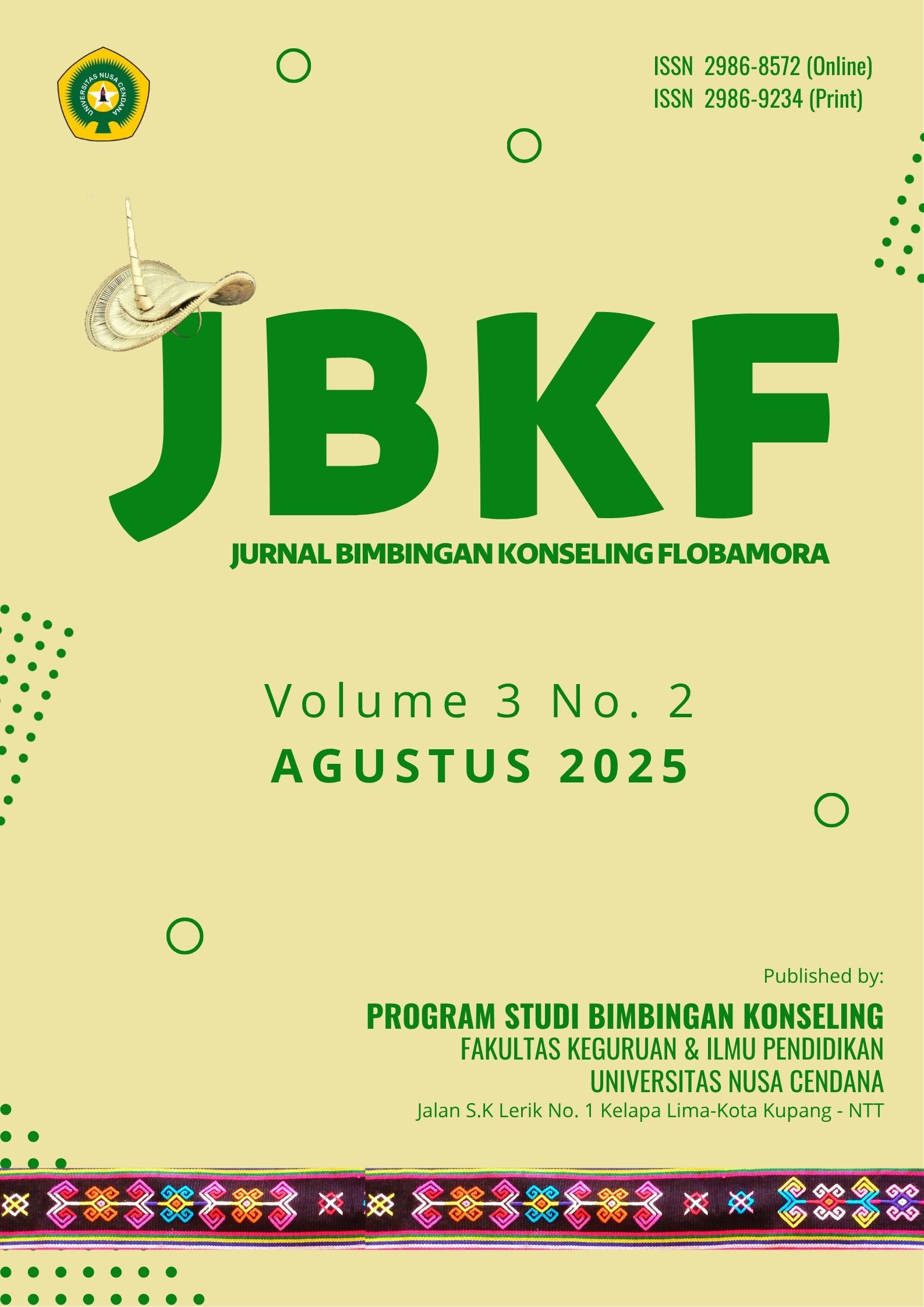Student Engagement dalam Kegiatan Intrakurikuler pada Peserta Didik di SMAN Keberbakatan Olahraga Flobamorata Kupang
Abstract
Student engagement refers to the active involvement of students in the learning process, encompassing behavioral, emotional, and cognitive aspects. In reality, not all students demonstrate optimal engagement, particularly in sports-based schools where they must divide their focus between academics and physical training. This study aims to describe the level of student engagement among students of SMAN Keberbakatan Olahraga Flobamorata Kupang. This research employed a quantitative approach with a descriptive design. The population and sample consisted of 144 students, determined through saturated sampling. Data were collected using a Likert-scale questionnaire. The findings revealed that most students demonstrated a high level of student engagement, with 75 students (52%) categorized as high. In terms of behavioral engagement, 68 students (47%) were in the moderate category. Emotional engagement was predominantly high with 72 students (50%), while cognitive engagement was also largely high with 67 students (47%). It can be concluded that students generally demonstrate optimal engagement in intracurricular activities despite carrying dual roles as learners and athletes. The implication is that schools should implement interactive and varied learning methods to sustain and enhance student engagement, particularly in behavioral aspects. The limitations of this study include the timing of questionnaire administration coinciding with training schedules, the use of a try-out within the actual sample, and the absence of a reference period of events in the questionnaire.student engagement
Downloads
References
An, D., Ye, C., & Liu, S. (2024). The influence of metacognition on learning engagement the mediating effect of learning strategy and learning behavior. Current Psychology, 43(40), 31241–31253
Appleton, J. J., Christenson, S. L., & Furlong, M. J. (2008). Student engagement with school: Critical conceptual and methodological issues of the construct. Psychology in the Schools, 45(5), 369–386.
Apriliana, I. P. A., & Masi, L. M. (2025). Rasch Analysis of Students' Emotional Intelligence; Implications for Vocational Education. KnE Social Sciences, 10(9), 15-25.
Apriliana, I. P. A., & Nalle, A. P. (2024, May). Measuring Academic Resilience Among Vocational Students; A Comparative Study Based on Vocational Fields. In 10th International Conference on Technical and Vocational Education and Training (ICTVET 2023) (pp. 15-21). Atlantis Press.
Arikunto, S. (2010). Metode penelitian. Jakarta: Rineka Cipta.
Azwar, S. (2010). Penyusunan skala psikologi. edisi 1. cetakan xiv. Yogyakarta: Pustaka Pelajar.
Connell, J. P., & Wellborn, J. G. (1991). Competence, autonomy, and relatedness: A motivational analysis of self-system processes.
Dalyono, M. (2007). Psikologi Pendidikan. Rineka Cipta: Jakarta
Fredricks, J. A., Blumenfeld, P. C., & Paris, A. H. (2004). School engagement: Potential of the concept, state of the evidence. Review of Educational Research, 74(1), 59–109.
Handayani, Y. I., Muhtar, E., & Jaryanto, J. (n.d.). Pengaruh Efikasi Diri Dan Manajemen Waktu Terhadap Keterlibatan Belajar Siswa Akuntansi. Jurnal Pengembangan Pendidikan Akuntansi Dan Keuangan (JPPAK), 4(1), 78–90.
Munirah, M. (2015). Pengembangan Keterampilan Menulis Paragraf melalui model pembelajaran berbasis masalah. Makassar: Program Pascasarjana Universitas Negeri Makassar.
Nasution. (2016). Buku Metode Penelitian. 3(3), 1–23.
Pakpahan, R. N., & Simanjorang, M. M. (2024). Pengaruh Student Engagement Dan Self Efficacy Siswa Terhadap Hasil Belajar Matematika Siswa Kelas VIII. Jurnal MathEducation Nusantara, 7(2), 55–62.
Pangerang, A. A., Saman, A., & Fadilah Umar, N. (2023). Pengaruh Student Engagement Terhadap Kejenuhan Belajar Siswa Sekolah Menengah Atas di Kabupaten Bulukumba The Influence of Student Engagement on High School Students’ Learning Saturation in Bulukumba Regency. Pinisi, 3(4), 128–135.
Paramita (2024) Kecenderungan Student Engagement Siswa Sekolah Menengah Atas Di Kota Bandung. Tesis S1, Universitas Pendidikan Indonesia
Profile SKO NTT 2023
Putri, R. A., & Suherman, U. (2021). Semangat, kepuasan, dan rasa tertarik siswa terhadap proses pembelajaran sebagai indikator keterlibatan emosional. Jurnal Psikologi Pendidikan, 9(2), 145–157.
Saraswati, M. N. (2023). Hubungan Antara Keterlibatan Siswa Dengan Kenakalan Remaja Pada Siswa Kelas Xi Di Sma Taruna Nusantara. Jurnal EMPATI,12(1) 1–6. https://doi.org/10.14710/empati.2023.28820
Sugiyono, P. D. (2010). Metode Penelitian. Kuantitatif, Kualitatif, Dan R&D
Sugiyono, D. (2013). Metode penelitian pendidikan pendekatan kuantitatif, kualitatif dan R&D. Alfabeta
Sugiyono. (2014). Metode Penelitian Kuantitatif, Kualitatif, dan R&D. Bandung: Alfabeta
Sugiyono. (2018). Metode Penelitian Kuantitatif, Kualitatif, dan R&D. Bandung: Alfabeta.
Willms, J. D. (2003a). Student engagement at school: A sense of belonging and participation: Results from PISA 2000.
Copyright (c) 2025 Maria Velixita Nasri, Khetye Romelya Saba, Febriana Febriana

This work is licensed under a Creative Commons Attribution 4.0 International License.

 Maria Velixita Nasri(1*)
Maria Velixita Nasri(1*)




.png)

_copy1.jpg)


